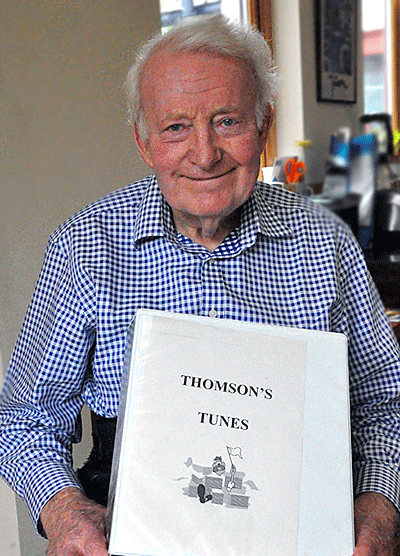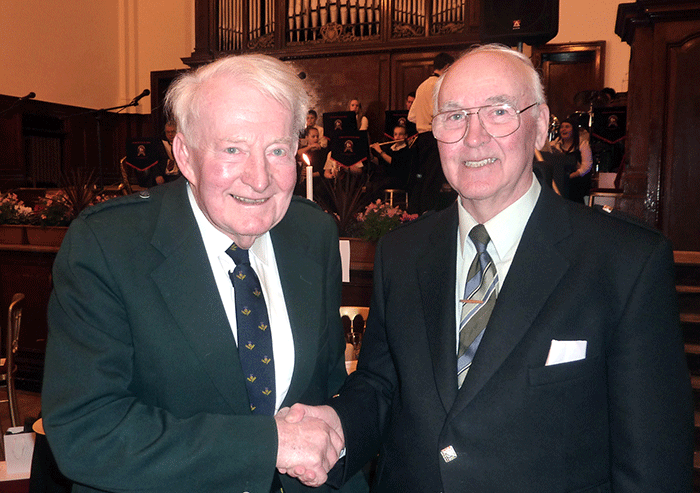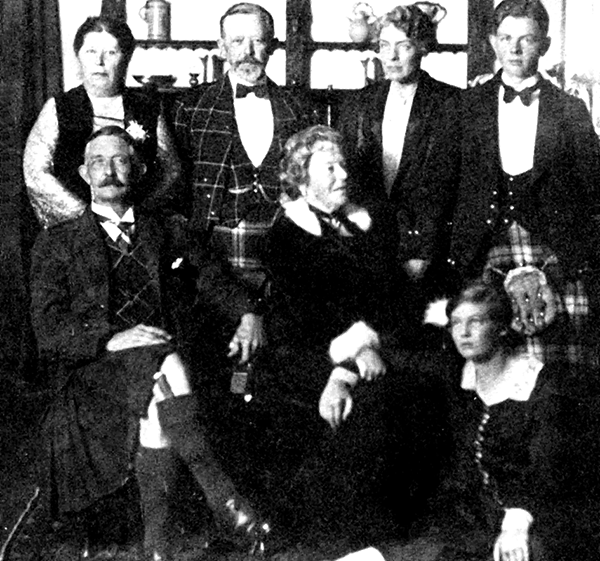
Very sorry to hear of the passing of Dr Bruce Thomson, writes the Editor. Bruce was a noted composer, his most famous tune being the 2/4 march Tommy MacDonald of Barguilean. I remember sitting next to Bruce at the Shotts Worlds Week concert several years ago when P/M Robert Mathieson asked him to stand take a bow before the band launched into the tune.
Hundreds in the audience turned to acknowledge Bruce and the delight on his face was a picture. Yet he was modest to a fault and never trumpeted his composing talent.
He learned the pipes whilst at Glenalmond School and served in the Gordon Highlanders. Bruce, a member of the Royal Scottish Pipers’ Society, was not just a piper however. He played rugby for Oxford University and was capped three times for Scotland (1953) and was a highly respected medic in the south of England during his professional career.
On retirement in 2000, he moved to Crieff where the pipes and pipe music composition became his passion. In his early writing days he would seek out advice in the art from the likes of Donald MacLeod and apply it to his own ideas. He composed over 400 tunes and produced three collections of music: ‘The Pass of Brander’, ‘The Pipers’ Well’ and ‘The Sma’ Glen’, some with CD accompaniment.

Bruce’s second wife Gillian died in 2014. We have lost a fine man. I understand there will be a private cremation followed by a Memorial Service at Fowlis Wester Kirk, Perthshire (near Crieff) on Saturday 8th February 11am to which all are welcome.
Here is more on Bruce from a detailed and personal interview he gave to the US’s MD Magazine in 2014: ‘Bruce Thomson boxed and played rugby for Oxford University, played rugby for Scotland and played the bagpipes for his Queen. And, somehow, found time to go through medical school and, in his retirement, continued to compose music for the bagpipes. He has now created and published 450 tunes which he says with a grin is ‘plenty for an instrument that has only nine notes’.
Bruce Thomson, MD was born in 1930 in Assam, India, the son of tea planters. It was the time of the British Raj, a system of governance for India started under Queen Victoria that did not end until 1947. British colonists in those days tended to send their children back to the old country for education.
At the age of 6, he was sent to Scotland where for four years he was educated in a small 50-pupil elementary school in Aberdeen then a larger middle school for another four years. There he became interested in the bagpipes.
‘My mother’, he says, ‘travelled from India, braving the U-boats in the middle of World War II, to find a public school that she felt would give me the education I should have. She interviewed and checked out all the headmasters of Scotland’s public schools – leaving them shaking in their shoes – and finally chose Glenalmond.’
At the age of 13 he won the piping competition at that school and became the pipe major of the school pipe band. He stayed at Glenalmond till he was 18 when National Service called. He joined the Royal Army Corps of Signals then later transferred to the Gordon Highlanders, the local Aberdeen regiment. At Fort George, the regimental HQ barracks, he was taught by Pipe Major Donald McLeod who encouraged Bruce to continue with his pipe compositions several of which were winning prizes.

Army over, he went to Keble College, one of the 30 colleges comprising Oxford University. He graduated with an honours degree in history and found a rugby home with a well-respected team, London Scottish.
‘After I graduated I tried several things. I was a failed school teacher then a failed business man then I suddenly realized I wanted to do medicine. So I did. I was poached by the Royal London Hospital medical school maybe on the basis of my rugby. I think I could have been accepted by any London medical school on that basis.’
Medical school over, Thomson returned to the Oxford area then Horsham, Sussex near London, where he spent more than 30 years, happy as physicians always are where they are helping their patients and in control of their lives.
He taught himself the accordion too, and found a top class fiddler where the two of them became the core of a local band that played at dances.
Bruce retired in his 60s, ‘but’, he says, ‘the pipe tunes continued to roll out’. And to accolades. Said Pipe Major Joe Wilson of the Gordon Highlanders, himself a prize winner in major piping competitions, ‘I know a good tune when I hear it. Doctor Bruce Thomson is well known for his composing ability. I have found great pleasure in playing his compositions.’
‘If you can look back on a good life you can die fearless,’ said Bruce. ‘As for retirement advice, I’d say, ‘Get yourself a hobby before you go, before you retire. Find something interesting (that will continue to interest you) and do it!
‘But retirement really is better shared. And perhaps the reason to retire is to take the time to enjoy life with a spouse you care about and love.’















